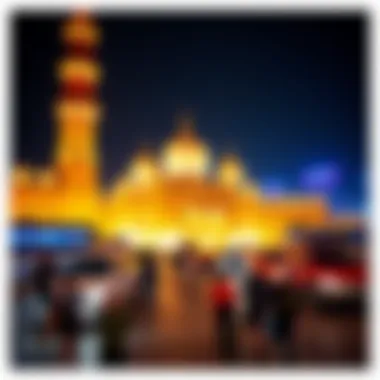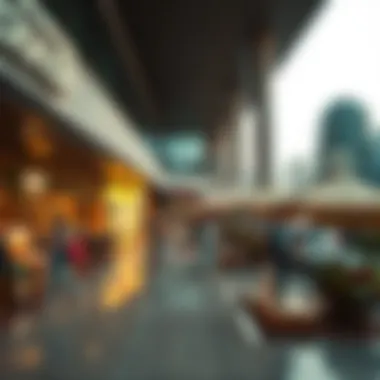Public Holidays in Dubai 2023: Key Dates and Insights


Intro
Dubai, a melting pot of cultures, is not just known for its towering skyscrapers and luxury shopping. It's also a city rich in traditions reflected vividly through its public holidays. The calendar year 2023 has several noteworthy holidays that resonate culturally and economically within the UAE. This article offers you a deep dive into these significant dates, and how they intertwine with the real estate market, impacting everything from rental demand to investment opportunities.
Public holidays in Dubai are more than just days off work; they are occasions for families to reunite, businesses to engage with the community, and visitors to gain insights into Emirati culture. As such, understanding these holidays becomes essential for anyone navigating the property sector here. A well-timed investment or strategic relocation could hinge on the understanding of holiday schedules and related cultural practices.
In the following sections, we’ll dissect the upcoming public holidays, explore market insights, and examine how these celebrations can influence real estate investment decisions. Whether you are an expat looking to settle in, a property investor eyeing new opportunities, or simply curious about how holidays shape life in this vibrant city, this guide aims to arm you with comprehensive information for making well-informed choices.
Overview of Public Holidays in Dubai
Understanding the public holidays in Dubai provides a window into both the culture and operational rhythm of this vibrant city. Residents and visitors alike can benefit from grasping these nuances, especially those involved in real estate or looking to navigate daily life here.
Cultural Significance
Public holidays in Dubai are steeped in rich traditions and resonate deeply with the cultural fabric of the UAE. They serve not just as days off but as occasions for families to come together, engage in communal activities, and reflect on their heritage. For instance, Eid al-Fitr, marking the end of Ramadan, is celebrated with grandeur—feasts, family gatherings, and various charitable acts are common practices. This holiday strengthens familial bonds and encourages community spirit.
Eid al-Adha, on the other hand, showcases themes of sacrifice, generosity, and gratitude. It’s during this time that many people engage in charitable activities, embodying the spirit of giving that is central to Islamic teachings. And let's not forget about National Day, an important occasion that commemorates the unification of the emirates. It’s a time overflowing with parades, fireworks, and deep national pride.
In practical terms, the cultural significance of these holidays makes them pivotal for anyone interested in understanding the local market trends, particularly in real estate. Investors and residents should keep an eye on how these dates may impact property demand and rental rates.
Government Regulations
The government plays a crucial role in formalizing public holidays, dictating not only the celebratory days but also the related regulations. For example, the UAE government officially announces the dates of public holidays based on the lunar calendar, which can shift from year to year. This aspect often leaves expatriates and investors needing to stay vigilant regarding any changes, as these announcements can influence both personal planning and business operations in the UAE.
Legal frameworks around public holidays also ensure that employees receive their rightful time off and holiday pay. Understanding these regulations is essential for businesses operating in Dubai. It allows them to align their operational calendars with the cultural expectations during holidays, ensuring staff morale and legal compliance.
In summary, the public holidays in Dubai are defined by a blend of cultural richness and governmental policies. Grasping their significance provides vital insights not just for residents or tourists, but equally for those in the real estate sector, making these holidays more than just a break from work.
Public Holiday Calendar for
Understanding the public holiday calendar in Dubai is pivotal for several reasons. This calendar not only marks the festive days enjoyed by residents and tourists but also impacts the city's economy, particularly in sectors like real estate and tourism. For investors and expatriates, being aware of these holidays can inform decisions on property management, rental agreements, and travel planning. Public holidays spark increased activity in the community, manifesting in various events and cultural expressions that draw in crowds. Hence, it's essential to be familiar with the dates and significance of these holidays to navigate the local landscape effectively.
New Year's Day
New Year's Day, celebrated on January 1st, is a moment of fresh beginnings. It's a public holiday that sees a marked increase in social activities. Many residents engage in fireworks displays across the city, but it also serves as a period for many expats to reconnect with their families back home over video calls. In real estate, this time can be a transitional phase, as many investors assess their holdings for the year ahead.
Eid al-Fitr
Eid al-Fitr is one of the most significant holidays in the Islamic calendar, marking the end of Ramadan. It's a time for feasting, family, and festivities. The exact date varies each year based on lunar sightings, but it typically occurs in April or May. This holiday can see a surge in rental demand as families host large gatherings, which means properties strategically located close to communal facilities can see upswings in short-term leases.
Arafat Day
Arafat Day holds immense importance in the Islamic faith, occurring on the second day of the Hajj pilgrimage. It usually falls a day before Eid al-Adha. On this day, Muslims fast and pray, and many in Dubai take part in various acts of charity. For the property market, this day might not induce direct changes, but it builds up to the larger festivities of Eid al-Adha, which can influence economic movements indirectly.
Eid al-Adha
Eid al-Adha, or the Festival of Sacrifice, follows Arafat Day and involves the Muslim practice of sacrificing an animal in the name of faith. This holiday is typically observed in June or July. Similar to Eid al-Fitr, this celebration also has implications on the real estate market. Many families look for larger spaces to accommodate relatives and friends visiting for the occasion. Short-term rentals can see increased prices, given the high demand for larger homes.


Islamic New Year
The Islamic New Year is observed on the first day of Muharram, marking the beginning of the Islamic lunar calendar. While it’s a quieter holiday compared to others, it holds significance for many as a time of reflection. Businesses often see varied workloads during this period, and while not necessarily a spike in real estate demand, some investment decisions may be influenced as families plan for the year ahead.
Prophet Muhammad's Birthday
Celebrating the birthday of the Prophet Muhammad, known as Mawlid al-Nabi, falls in the Islamic month of Rabī' al-Awwal. It is a time devoted to prayer and remembrance. The observance of this day varies, but cultural events and activities are organized in honor of the Prophet’s teachings. Property activities during this time may remain stable, as many prefer to invest in the sentiment of the holiday rather than engage in large purchases.
Commemoration Day
Commemoration Day, observed on November 30, honors the sacrifices made by Emirati martyrs. It’s a day of reflection and remembrance, and community events can bring people together in somber unity. The impact on the property market may not be direct but can instill a sense of belonging and community within expatriates and residents alike.
National Day
December 2 marks National Day, celebrating the formation of the United Arab Emirates. This holiday is characterized by joyous celebrations, fireworks, and cultural displays. The festivity encourages a spike in tourism, which can lead to increased occupancy rates in properties thanks to visitors. For investors, it is a reminder to capitalize on the festive spirit to market their listings effectively during this time when potential clients may be more open to making commitments.
Understanding the public holiday calendar is crucial for navigating the intricacies of the Dubai property market.
With these dates and considerations in mind, it's clear that public holidays in Dubai create a unique tapestry of cultural and economic activities. Recognizing their significance can aid both residents and investors in making informed decisions throughout the year.
Impact of Holidays on Real Estate Market
Holidays in Dubai play a crucial role beyond celebrations and traditions; they also have a significant impact on the local real estate market. Understanding these influences can aid investors, realtors, and expatriates alike in making more informed decisions. The public holidays can trigger changes in rental demand, property management practices, and investment opportunities, yielding insights into the city’s evolving landscape.
Rental Demand Fluctuations
During public holidays, the rental market in Dubai often experiences notable shifts. When residents and tourists have time off from work, demand for short-term accommodations tends to spike. Major holidays like Eid al-Fitr and National Day see a marked increase in bookings for apartments and villas as families gather and tourists flock to enjoy festivities.
For instance, around Eid, popular districts such as Downtown Dubai and Dubai Marina witness an influx of visitors, leading to higher rental prices for properties in these areas. Real estate agents report that vacation rental platforms like Airbnb are particularly bustling during these peak periods.
On the other hand, some landlords revise pricing strategies during holidays to attract more tenants, especially in locations less trafficked by tourists. This fluctuation means that those seeking rental properties should be aware of changing market conditions.
- Factors Contributing to Demand Fluctuations:
- Holiday-specific Events: Activities tied to local customs can rally interest.
- Availability of Rental Options: More listings become available during holidays due to short-term leases.
- Complementary Services: Facilities like transportation and family activities become heightened.
This heightened demand during holidays dictates the rental market's health and should be closely monitored by potential renters and landlords alike.
Investment Opportunities
Public holidays also present unique investment opportunities in Dubai’s real estate market. As festive seasons often encourage infrastructure investments, government spending spikes significantly in preparation for events like National Day and Eid celebrations.
Investors should consider that these periods can yield short-term gains through property acquisitions in burgeoning locales or through renovation projects that cater to high tourist influx. Projects in areas offering recreational activities, entertainment, and family-friendly amenities can attract higher returns.
Moreover, increased rental demand during holidays has led some investors to focus on properties suitable for short-term leasing. The popularity of serviced apartments and vacation homes has surged, fueled by both domestic travelers and international tourists. It is essential to assess the potential of these kinds of properties, particularly as the trend of experiential travel rises.
- Key Investment Considerations:


- Location: Proximity to tourist hotspots or traditional gatherings can align investments with demand.
- Market Trends: Understanding rental cycles during holidays can inform timing for buy-and-hold strategies.
- Regulations: Investors must stay abreast of any local regulations regarding rental properties, especially during peak seasons.
In summary, public holidays in Dubai shape not just cultural and social interactions but also act as catalysts for real estate dynamics. As both rental demands fluctuate and new investment opportunities surface, strategic engagement with the real estate market during these periods can yield favorable outcomes.
Cultural Events and Celebrations
Cultural events and celebrations in Dubai are not just festive occasions; they reflect the city's rich heritage and offer an insight into its evolving identity. These events are crucial for fostering community bonds, showcasing artistic expressions, and promoting cultural understanding among residents and visitors alike. With Dubai's diverse population, public holidays transform into a melting pot of traditions, where people from various backgrounds come together. This communal spirit not only enhances the social fabric but also presents opportunities for growth in sectors like tourism and retail.
As investors and homebuyers engage with the local community, understanding these cultural celebrations can provide substantial dividends. Real estate markets often see a swell in interest during public holidays, driven largely by increased tourism and local festivities. Thus, having a good grasp of the cultural landscape becomes invaluable for making informed decisions in the property market.
Festivities During Eid
Eid celebrations in Dubai epitomize the cultural vibrancy of the Emirate. Eid al-Fitr, which marks the end of Ramadan, brings joy and generosity. Families come together to share meals, exchange gifts, and sometimes even visit each other’s homes dressed in elaborate traditional attire. These gatherings are more than social; they carry deep religious significance, underscoring the values of compassion and unity.
The local government often organizes public events to commemorate Eid, including fireworks, cultural shows, and community prayers. The Dubai Festival City Mall, for example, hosts elaborate light and sound shows that draw considerable crowds during this time. The PMDs (Public Management Departments) of Dubai also contribute by ensuring public spaces are festive and welcoming.
During Eid al-Adha, families engage in charitable acts, reflective of the holiday's emphasis on giving. This, alongside the celebrations, encourages a spike in tourism as international visitors flock to the city, eager to partake in these meaningful festivities.
National Day Activities
National Day, celebrated on December 2, marks the UAE's unification and independence, and in Dubai, the significance of this day is palpable. The streets come alive with flags, parades, and performances. Local communities often organize gatherings to celebrate national pride, which in turn attracts tourists keen on witnessing this spirited display.
Activities range from spectacular fireworks over iconic sites like the Burj Khalifa to cultural exhibitions in parks and public squares. These events illustrate the richness of Emirati culture through traditional dances, music, and art. Beyond just celebration, National Day also serves as a reminder of the UAE's rapid development and future aspirations.
"A nation's strength resides in the culture it fosters. Celebrating National Day offers a glimpse into the heart of Dubai's society, emphasizing unity and progress."
For investors and expatriates, participating in or observing these festivities can provide insights into the local customs and community values, aiding in relationship building and potential investment opportunities. As these cultural events unfold, they offer a unique lens through which one can appreciate the ever-evolving narrative of Dubai.
Travel and Tourism during Public Holidays
Public holidays in Dubai bring about a significant surge in travel and tourism, creating a unique atmosphere that attracts locals and visitors alike. Understanding this dynamic can be instrumental for investors in the tourism sector, realtors looking to cater to temporary relocations, and homebuyers aiming to make the most of their time in the city. The diverse festivities create numerous opportunities to engage in local culture, partake in celebrations, and visit various attractions, enriching the overall experience of Dubai.
During public holidays, the enchantment of Dubai comes to life, illustrating the city’s vibrant heritage and modern sensibilities. Tourists find the streets bustling with activity, restaurants offering special menus, and local markets brimming with unique crafts. Residents often play hosts, welcoming family and friends to celebrate, which enhances the communal feel and tourism experience, thereby pushing forward the city’s reputation as a premier destination.
Increased Tourist Traffic
With holidays marking special occasions, there is nearly always a noticeable uptick in guest arrivals. Tour operators anticipate and prepare for this influx, organizing special events and tailored packages.
- Eid al-Fitr and Eid al-Adha attract not just tourists from surrounding countries, but also international travelers keen on experiencing traditional Islamic celebrations.
- The National Day sees fireworks, parades, and various festivities that draw crowds, turning Dubai into a focal point for both celebrations and travel.
This surge benefits local economies, from hotels which adjust their rates and services to cater for increased bookings, to restaurants that ramp up staff and menu offerings. During these holidays, it’s not just about vacations; it’s about experiencing the essence of Dubai's hospitality.
Travel Recommendations
Visitors wishing to navigate Dubai during these bustling public holidays would do well to consider a few tips:
- Book Accommodation Early: With the influx of tourists, finding a good place to stay can be tricky. It’s advisable to secure bookings well in advance to avoid last-minute confusion and inflated prices.
- Explore Local Events: Dive into local festivities. Many hotels and community centers organize special events that provide a glimpse into the culture and traditions of the Emirati people. Websites like Visit Dubai offer updated information on current events happening across the emirate.
- Public Transport: It can be jam-packed during holidays. Opt for public transport like the Metro or buses to bypass traffic chaos. Plus, it provides a unique way to experience the city as locals do.
- Flexibility: Stay open to adjusting your plans. The sheer number of events may require a bit of shuffling to fit everything in.


Embracing both the local and foreign elements during these festive periods is invaluable. The blend creates an engaging experience for all, solidifying Dubai's status as not just a stopover, but a must-visit destination.
"Travel during public holidays in Dubai offers a multi-faceted view of the emirate, providing both relaxation and cultural connection, which is invaluable in today's ever-globalizing world."
Several tourism sectors thrive during these holidays, showing that the travel boom benefits tourists and local businesses alike. For further insights, the Dubai Department of Tourism and Commerce Marketing provides a wealth of resources to help both visitors and investors alike understand the potential benefits these peak times can bring to the region.
Workplace Policies During Holidays
Public holidays in Dubai hold significant weight in understanding the cultural and economic fabric of the city. However, equally important are the workplace policies that govern how these holidays are managed within various sectors. As Dubai continues to grow as a global hub, the interplay between holiday observance and workplace regulations becomes crucial for both employers and employees. These policies shape employee satisfaction, business revenue, and operational efficiency during festive seasons.
Holiday Pay Regulations
In Dubai, holiday pay is a central aspect of labor regulations, especially during public holidays. The law mandates that full-time employees are entitled to paid leave on these special days. This is important not just to honor a worker's right to celebrate but also to maintain morale and loyalty.
Workers typically receive their regular pay if they take leave during these periods, but there are specific guidelines for overtime work. Under UAE labor law, if an employee works on a public holiday, they are entitled to either pay at double the regular rate or a compensatory day off. This is where it gets tricky; not all employers are fully aware of these rules, leading to potential discrepancies.
Here are several key factors regarding holiday pay:
- Paid Leave: Full-time employees are granted paid leave on public holidays.
- Overtime Compensation: Special regulations exist for employees who are required to work on holidays.
- Awareness and Compliance: Employers need to stay updated about their legal obligations to avoid penalties.
These regulations not only foster a sense of fairness in the workplace but encourage businesses to plan effectively around holiday periods.
Leave Policies
Leave policies during public holidays are equally vital. Understanding these can make or break employee satisfaction and directly impact business operations. In Dubai, companies often establish their own unique policies regarding leave, reflecting the diversity of the workforce and the nature of the business.
Typically, these policies highlight aspects like:
- Advance Notification: Employees are usually required to inform their managers about their intended leave well ahead of the holiday.
- Carry-Over Leave: In some cases, employees can carry over unused leave days to the next year, subject to company policy.
- Special Considerations: Some businesses may have adjusted policies for expatriates, recognizing diverse cultural traditions and practices.
Having clear leave policies is not just an HR formality; it ensures that employees can plan their time off without ambiguity. This way, businesses can maintain productivity while respecting the cultural significance of holidays.
Understanding workplace policies is crucial for nurturing a harmonious work culture. Employers who prioritize clear guidelines and compliance tend to see better engagement and productivity.
Future of Public Holidays in Dubai
As we look towards the future of public holidays in Dubai, it's essential to recognize how these observances serve not only as markers on the calendar but also as reflections of a community's identity and its evolving dynamics. The significance of holidays extends beyond mere days off; they encapsulate shared traditions, foster community spirit, and influence economic activities. An understanding of potential changes and how globalization plays a role is crucial for residents and investors alike, shaping the landscape in which they operate.
Potential Changes in Observance
Dubai has witnessed considerable transformations over the past few years, and the potential for changes in public holiday observance is on the horizon.
- Cultural Integration: As more expatriates settle in the UAE, the blend of cultures may lead to the introduction of additional holidays that honor different customs and traditions. For instance, the recognition of specific holidays from the diverse communities could become more prevalent, bolstering local festivities and enhancing social cohesion.
- Official Policies: Government directives may also adapt in response to demographic changes. There could be an expansion of time off for significant dates that represent the multicultural makeup of Dubai. This can foster inclusivity and respect for various cultures living within the emirate.
- Corporate Adjustments: Companies may begin to reflect these changes in their holiday policies. With more multinational organizations establishing their roots in Dubai, there may be shifts towards flexible leave days where employees can choose their holidays based on personal significance, rather than sticking strictly to the calendar.
- Digital Observance: The rise of technology might see holidays being celebrated in more virtual spaces. Online events and activities might gain traction, bringing people together, regardless of where they are.
These potential changes necessitate careful consideration as they could greatly affect workers, families, and businesses, altering how time off is valued and enjoyed.
Impact of Globalization
Through the lens of globalization, public holidays in Dubai are on a trajectory that is increasingly interconnected with global events and practices.
- Influence of International Norms: As Dubai aligns more with world trends, there might be a tendency to observe international holidays, such as Thanksgiving or New Year's Eve celebrations depending on local customs, reflecting the global nature of business and society.
- Travel and Tourism: The globalized environment presents opportunities for tourism during these holidays. Increased awareness of Dubai as a major travel hub may result in more international tourists flocking in during prominent local holidays, boosting the economy.
- Cultural Exchange Programs: With various cultures mingling in Dubai, exchange programs may promote the celebration of different holidays. This would not only enhance understanding but also encourage participation in festivities beyond one’s cultural background.
- Shift in Workforce Demographics: As the workforce becomes more diverse, companies may adapt their holiday observances, offering unique benefits to attract talents from around the globe. A shift towards more flexible working arrangements could allow celebration of important days that hold significance to a broader demographic.
In essence, the future of public holidays in Dubai holds the potential for a vibrant tapestry of traditions that draw from both local heritage and global influences.















